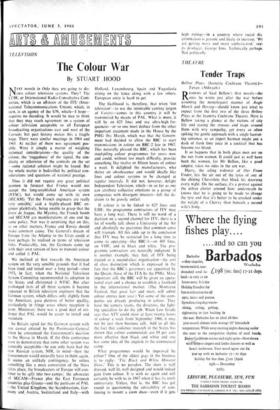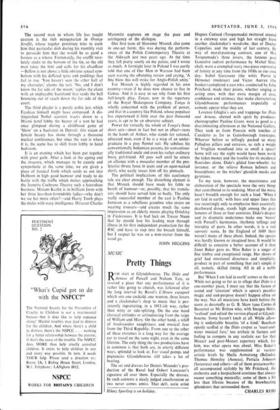THEATRE
Tender Traps
READERS of Saul Bellow's first novels—the ones he wrote just after the war before assuming the monologuist manner of Augie March and Herzog—should know just what to expect from the first two of the three Bellow Plays at the Jeanetta Cochrane Theatre. Here is Bellow taking a glance at the victims of city life and eyeing the stresses and traps around them with wry sympathy, yet every so often spiking the gentle approach with a single lacerat- ing sentence, as an expert barman might put a dash of fresh lime juice in a cocktail that has become too bland.
It so happens that in both plays men are on the run from women. It could just as well have been the women, for Mr Bellow, like a good umpire, takes no sides in the sex war.
Harry, the ailing widower of Out From Under, lets the air out of the tyres of one of the shining Chevrolets that block his doorway every night. On the surface, it's a protest against the urban clutter around him; underneath he knows that he is going to be made to change the tyre and that it's better to be crushed under the weight of a Chevvy than beneath a second wife's body.
The second man to whom life has taught caution is the rich octogenarian in Orange Soufflé, whose regular prostitute tries to cook him that particular dish during his monthly visit to persuade him that she would be as good a hostess as a whore. Fortunately, the soufflé reso- lutely sticks to the bottom of the tin, so the old man takes the hint and calls for his chauffeur —Bellow is not above a little obvious sexual sym- bolism with his deflated tyres and puddings that fail to rise. 'You haven't seen the other half of my character,' claims the tart. 'No, and I don't know the far side of the moon,' replies the client with an unplayable backhand that sends the ball bouncing out of reach down the far side of the court.
The third playlet is a purely pubic jest, which Feydeau himself might have composed. A dis- tinguished Nobel scientist tracks down to a Miami hotel lobby the bearer of a wen he had once glimpsed during a childhood game of 'Show' on a backstair in Detroit; this vision of female beauty has shone through a thousand nuclear conferences, but since the wen is where it is, the scene has to shift from lobby to hotel bedroom.
It is an evening which has been put together with great guile. After a look at the ageing and the insecure, which manages to be caustic and sympathetic at the same time, we are given a piece of farcical froth which sends us out into Holborn in high good humour and ready to do battle with the traffic which makes approaching the Jeanetta Cochrane Theatre such a hazardous business. Miriam Karlin is in brilliant form with her three less-than-formidable ladies—why don't we see her more often?—and Harry Towb plays the males with wary intelligence. Director Charles
Marowitz captures on stage the pace and astringency of the dialogue.
Our first taste of Slawomir Mrozek also came in one-act form; this was during the perform- ances of the Polish Contemporary Theatre at the Aldwych just two years ago. At the time they fell pretty sourly on my palate, and I wrote as much. A fortnight later in Poland I was curtly told that one of Our Men in Warsaw had been seen waving the offending review and crying, 'A fine blow this will strike for Anglo-Polish unity.'
For Mrozek is highly regarded in his own country—even if he does now choose to live in Genoa. And it is easy to see why from his first full-length play, Tango, now in the repertory of the Royal Shakespeare Company. Tango is wholly concerned with the problem of power, and that in a country like Poland, whose populace has experienced it little over the past thousand years, is apt to be an obsessive subject.
Power for virtually the whole of Tango's three short acts—short in fact but not in effect—rests in the hands of Arthur, who stands for rational, educated man, even if he is a wisp of an under- graduate in a grey flannel suit. He subdues his conventionally bohemian parents, his convention- ally traditional uncle and even his rather ordinary busty girl-friend. All goes well until he enters an alliance with a muscular member of the pro- letariat (brute force in jeans and an open-necked shirt), who easily tosses him off his pinnacle.
The political implications of this cautionary tale are clear enough. The disturbing element is that Mrozek should have made his fable so bereft of humour—or, possibly, that his transla- tors should have served him so badly. The only really successful member of the cast is Pauline Jameson as a rebellious grandma who insists on wearing trousers—and creates much the same impression as an elderly mezzo playing Orlofsky in Fledermaus. It is bad luck on Trevor Nunn that he should lose his leading man- through illness in his first independent production for the RSC and have to step into the breach himself, but I suspect he was on a non-starter from the word go.
JOHN HIGGINS



































 Previous page
Previous page